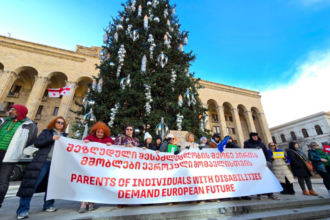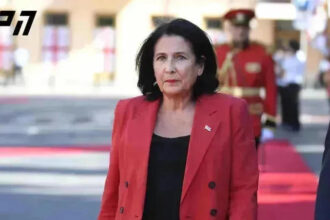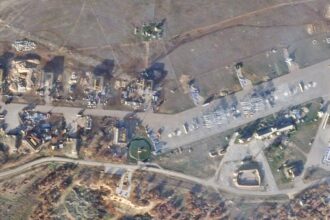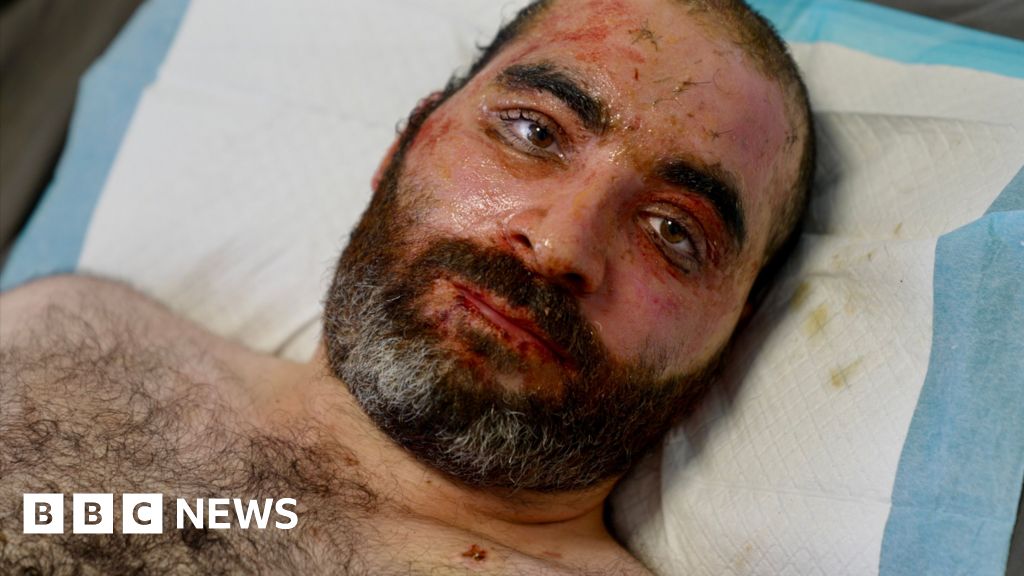Mohammed and his friends were handing out hot meals to their elderly neighbours when the air strike struck. They had been doing this since Israel’s last invasion of Lebanon, on 1 October.
The 29-year-old civil engineer was standing approximately 5m (16ft.) away from the blast, which destroyed a home in his village, in southern Lebanon.
His cheeks and forehead were charred, leaving his face pink and raw. His hands were charred. His abdomen was burned to a third-degree degree. He still feels pain and trauma two weeks later, but he wants to share his story.
He says in a low tone, “It was black and smoke everywhere.” It took about a moment. Then I began to recognize what was around me. I noticed that my two friends were still breathing but bleeding heavily. It took the people about five minutes to get us out.”
Mohammed describes the horrors he has experienced from his bed at the Nabih Berri Government Hospital, perched on the hilltop of Nabatieh. It is one of largest cities in the South, and only 11km (7 miles) away from the border with Israel. It was home to 80,000 people before the war.
Mohammed claims that there was no warning given before the strike. “Not at all, to us, to our neighbours or to the person who was inside the house which was struck.”
He says that the person who was killed was a policeman.
He says “We aren’t military,” “We aren’t terrorists.” Why are we being attacked? “All the areas that are being targeted are civilian areas.”
Mohammed will return to his village Arab Salim when he is discharged. However, it remains under fire. “I have nowhere else to go,” says Mohammed. “If I [could] leave, I would.” “There’s no place.”
While we are touring the hospital, a second air strike sends staff running to a balcony to check what was hit this time. The hospital offers a panoramic look at grey smoke billowing up from high ground around 4km away.
A few floors below, in the emergency room, a siren wails to warn of the arrival of casualties – from this air strike. It had struck Mohammed’s village Arab Salim.
A woman is carried in on a stretcher with blood running down her face. Her husband follows her, who hits the wall in frustration and then collapses in shock. Doctors examine her behind closed doors.
Within minutes, the hospital director, Hassan Wazni tells staff that she has a ruptured arterial and must be transferred to a specialised centre for vascular care in a hospital farther north.
“She needs it now,” he says as cries for help come from the examination room. “Talk to Saida (a nearby town). If it’s okay, let’s go immediately because she can’t hold out.
The hospital receives between 20-30 casualties a day from Israeli air strikes. The majority are civilians but no one is turned away. “We accept all patients, all injured, all martyrs,” he says. “We don’t discriminate.”
Dr Wazni is the only doctor who has never left the hospital since war began. He opens a packet behind his desk at his office. “I think it’s okay to break some rules in war,” he says, with an apology.
He struggles to pay his wages and to come up with 1,200 litres per day of fuel to run the generators which power the hospital. “We don’t get anything from the government,” says he. “It does not have it.”
Espresso is his fuel, which he offers to us repeatedly.
Nabih Berri, the main public hospital of the city, has 170 beds. However, it only has a skeleton crew and 25 patients. The sick and wounded are quickly transferred to hospitals in safer regions further north. Staff report that “many strikes” have occurred near Nabih Berri. During our visit, there was broken glass in the foyer.
Nabatieh is under fire since more than a week.
The explosion of the municipality building on 16 October killed Ahmad Kahil and 16 other people. He was at the time in a meeting to coordinate aid distribution. As we pass the ruins, flatbread remains visible on the floor.
The massive strike has brought down several buildings in the neighbourhood – an entire city block has disappeared from the landscape.
Also missing is a market from the Ottoman period – the heart Nabatieh. It was destroyed on 12th October. Centuries of history have been reduced to rubble and heritage has been reduced to dust.
Hussein Jaber (30), who works for the emergency services of the government, treasures his old market or souk. He and his men – some of whom are volunteers – take us there for just a short visit. They drive fast – it’s the only way they can get around in Nabatieh.
Hussein gestures at concrete slabs and twisted metal, saying “We were raised here.” “We’ve been here since we were kids. The souk is very important to us. It’s really sad to see the souk in this state. It is a reminder of the past, and of the wonderful days we shared with the people of this town.”
Hussein, like Dr Wazni and his colleagues, have remained loyal to the people despite the risks. According to Lebanese figures, more than 110 paramedics or first responders were killed by Israeli attacks on Lebanon in the last year – the majority of them within the last month. Human Rights Watch, an international campaign group says that some attacks involve “apparent crimes of war”.
Hussein lost both a colleague and friend in a recent air strike, which took place 50m away from the civil defence station where they sleep on mattresses against the windows. Naji Fahes was 50 years old, and had two children.
Hussein says, “He was strong and enthusiastic and loved to help other people.” “Even though older than us, Hussein was the one who rushed to go on missions to be with people and rescue them.”
He died as he lived.
Naji Fahes, who was outside the station at the time of the air strike, was ready to embark on a mission.
We have company as Hussein speaks. A drone from Israel circles the sky above, then gets louder and lower. The drone’s buzzing competes with his voice. “We hear it 90% the time,” says he. “We think that it is directly above us right now. Most likely, it’s watching.
Hezbollah’s presence in the city has been hidden.
The Israel Defence Forces (IDF) said that they “operate solely against Hezbollah terrorist organization, not against Lebanese populations.”
Israel declares that its fight is against “the Hezbollah terrorist organization, embedded in civilian population and infrastructure”.
A spokesman stated that “many measures are taken to minimize civilian harm, including advance warnings”, but there was no warning given for the airstrike that injured Mohammed or the attack that killed Mayor.
In the five-and-ahalf hours we spent in this once bustling metropolis, we saw two people walking in the street. Both fled, unwilling to talk. During our visit, a drone broadcast messages from the Israeli military – telling people to leave immediately.
Only a few hundred people are estimated to remain in the city, unwilling or unable move elsewhere. The majority of them are the elderly and poor, who will either live or die in their city.
Hussein will be there, along with his team, to help them. He says, “We are a safety net to the people.” “We will remain and we will continue.” We will be right next to the civilians. “Nothing will stop us.”
Additional reporting by Wietske Mrad and Angie Mrad
Read More @ www.bbc.com




